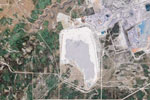View Larger Map
The tar sands as seen from Google Earth near Fort McMurray, Alberta.
The Obama administration today announced it is scrapping TransCanada’s Keystone pipeline after Republicans forced a 60-day deadline on the issue in a Congressional rider. The State Department advised against the pipeline arguing that the deadline did not give the department enough time to determine if the pipeline “served the national interest.” The cancellation of the pipeline is a victory for environmental and social activists who fought the project for months, but Republicans are blasting the administration.
“This announcement is not a judgment on the merits of the pipeline, but the arbitrary nature of a deadline that prevented the State Department from gathering the information necessary to approve the project and protect the American people,” Obama said in a written statement. “I’m disappointed that Republicans in Congress forced this decision, but it does not change my Administration’s commitment to American-made energy that creates jobs and reduces our dependence on oil. Under my Administration, domestic oil and natural gas production is up, while imports of foreign oil are down.”
The Keystone pipeline would have carried tar sands oil 1,700 miles from Canada through six U.S. states to Texas, crossing one of the U.S.’s most important freshwater sources, the Ogallala Aquifer. Still, the cancellation of Keystone, while a significant delay, is not the end the debate. The Obama Administration has left the door open for TransCanada to suggest another route to bring tar sands oil to Texas, so long as it avoids Nebraska’s Sand Hills region.
 Protestors create human chain around White House. Photo by: Emma Cassidy. |
“President Obama is about to destroy tens of thousands of American jobs,” a spokesperson for Republican House Speaker John Boehner said. TransCanada first reported the Keystone Pipeline would bring 5,000 jobs to the U.S., but boosted those numbers once opposition against the pipeline rose. Almost all of the jobs would be temporary.
Protests against the Keystone pipeline galvanized the environmental movement in the U.S. and brought new life to the national debate on climate change. In August of last year, 1,253 people arrested in civil disobedience acts against the pipeline. Then in November, some 12,000 people encircled the White House in a massive protest against the pipeline.
“This isn’t just the right call, it’s the brave call,” said Bill McKibben, head of 350.org, and one of the major organizers of the fight against the pipeline. “The knock on Barack Obama from many quarters has been that he’s too conciliatory. But here, in the face of a naked political threat from Big Oil to exact ‘huge political consequences,’ he’s stood up strong. This is a victory for Americans who testified in record numbers, and who demanded that science get the hearing usually reserved for big money.”
U.S. proponents of the pipeline countered that the project would create jobs in the midst of a downturn and would allow the U.S. a secure oil source from a friendly neighbor. Activists respond that it’s time to get off oil and move aggressively toward renewable energy.
Reasons against the Keystone pipeline were many and varied, from oil spill impacts to indigenous issues. But for most activists, the largest issue was climate change. Climatologist, James Hansen, has stated that if the full-extent of the tar sands are exploited along with the world’s coal reserves “it is essentially game over” for the climate.
In terms of carbon emissions, Cambridge Energy Research Associates (CERA) estimated the greenhouse gas emissions of the tar sands was 5-15 percent higher than conventional sources, while the International Energy Agency (IEA) found that emissions were 20 percent higher. Others have given higher numbers.
“No one who understands the urgent realities of global climate change could reasonably consider this pipeline in the best interest of the United States, humankind or the planet we all share,” said Carroll Muffett, President of the Center for International Environmental Law (CIEL).
In Canada the exploitation of the tar sands has led to water pollution, political conflict with First Nations people, large-scale deforestation in the Boreal, and alleged cancer clusters. In addition, rising emissions from exploiting the tar sands pushed Canada to abandon the Kyoto Protocol.
President Obama called Canada’s Prime Minister, Stephen Harper, today with the news. Harper, who is linked with the oil industry by his critics, told the president he was profoundly disappointed.
Related articles
Obama Administration bows to pressure, delays tar sands pipeline
(11/10/2011) In what can only be described as a major victory for green activists, the Obama Administration has announced it will delay a decision on TransCanada’s controversial Keystone XL pipeline for 12-18 months. Notably, putting the decision off until after the last election. The delay comes less than a week after about 12,000 people encircled the White House in opposition to the Keystone XL pipeline, which they argue threatens one of the most important water supplies in America’s heartland and will worsen climate change.
12,000 surround White House to protest tar sands pipeline

(11/07/2011) One year to the day before the 2012 US election, up to 12,000 activists encircled the White House to protest the Keystone XL pipeline, a proposed 1,700 mile pipeline that would carry oil from Canada’s infamous tar sands to the US and other foreign markets. Critics of the TransCanada pipeline have warned of potential spills in America’s heartland as well as the climate impacts of allowing more tar sands oil, which has a higher carbon footprint than conventional sources, into the US and other markets. The issue has galvanized climate and environmental activists in the US with the massive rally on Sunday preceded by civil disobedience actions in late summer that lead to the arrests of 1,253 people.
Tar sands pipeline ‘another dirty needle feeding America’s fossil fuel addiction’

(10/11/2011) Climate and environmental activism in the US received a shot of enthusiasm this summer when it focused unwaveringly on the Keystone XL Pipeline. During a two week protest in front of the White House, 1,253 activists—from young students to elder scientists, from religious leaders to indigenous people—embraced civil disobedience for their cause and got themselves arrested. Jamie Henn, spokesperson with Tar Sands Action, which organized the protests, and co-founder of climate organization 350.org, told mongabay.com that,”the reason the Keystone XL pipeline has emerged as such a key fight is because it is on a specific time horizon, the Administration says it will issue a decision by the end of this year, and the decision whether or not to grant the permit rests solely on President Obama’s desk. This is a clear test for the President.”